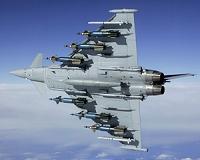| . |  |
. |
Brussels (AFP) March 30, 2011 As NATO gallops into the Libyan conflict, the European Union's grand defence project is left watching from the sidelines, with little enthusiasm among EU states to kick it into high gear, analysts say. The 27-nation bloc wrote into its Lisbon Treaty, now 15 months old, ambitious plans to deepen military cooperation between EU states with the ultimate goal of building a common security and defence policy. But the Libyan revolution has put a spotlight on the listlessness of the European defence agenda. Tired of waiting for the project to move forward, one of its main champions, France, decided in November to strike a major bilateral cooperation agreement with Britain. Paris and London "decided to do what the EU had desperately tried to do for a decade," said Federico Santopinto, expert at the Brussels-based GRIP defence research centre. "They began a partial but concrete process of military sharing in the hope of maintaining their global reputation, saving money at the same time," he said. The Libyan crisis, where Britain and France are playing major roles in a US-led bombing campaign against Moamer Kadhafi's forces, was "the first chance" for the pair to "put theory into practice", he added. By teaming up with Britain, a sceptic of the European defence project, France is hitting back at EU partners, most notably Germany, that have shown little interest in moving forward, the analyst said. Despite the lack of progress in the European common defence policy, EU ambassadors are mulling a military operation to help support any mission to protect Libyan refugees. But as one disenchanted European diplomat put it, "we will only put it in place if we are sure that we will not have to use it." The US-led coalition is handing off all military operations to NATO, and the staunchest backers of the transatlantic alliance within Europe may want NATO to handle humanitarian missions too. "The EU's security and defence policy is closed until further notice," the diplomat said. Britain has consistently opposed the creation of a European military headquarters or boosting the European Defence Agency, whose budget it insisted on freezing this year. After launching the military campaign in Libya with France, the EU's other big military power, London finally stepped back, leaving Paris in the lurch by joining the calls for NATO to take over the mission. Francois Heisbourg, special adviser to the Security Research Foundation in Paris, said the death bells for EU defence tolled with the appointment of Catherine Ashton as EU foreign and security policy chief in 2009. "She has no interest at all in common security and defence policy," Heisbourg said. The policy will go nowhere as long as European powers -- Germany, France, Britain, Spain, Italy and Poland -- "don't show more enthusiasm to invest politically and militarily in European defence," he said. European defence could end up in the dustbins of EU history, like the Euratom nuclear project from the 1950s. "Libya shows that with the instruments at our disposal now, European defence is not working. We need to find new ones," said a Polish diplomat, whose country take over the rotating EU presidency in July for six months, hoping to relaunch the project.
Share This Article With Planet Earth
Related Links The Military Industrial Complex at SpaceWar.com Learn about the Superpowers of the 21st Century at SpaceWar.com
 Typhoon's Libya debut seen as sales boost
Typhoon's Libya debut seen as sales boostCairo (UPI) Mar 25, 2011 The Eurofighter Typhoon has flown its first combat missions over Libya as part of Operation Odyssey Dawn, giving a boost to its European makers' drive to sell the $120 million, delta-winged fighter in big-ticket strike jet deals in Japan and India. "It never hurts to have the 'as used in combat' stamp," said Francis Tusa, editor of the Defense Analysis newsletter. The Typhoons fr ... read more |
|
| The content herein, unless otherwise known to be public domain, are Copyright 1995-2010 - SpaceDaily. AFP and UPI Wire Stories are copyright Agence France-Presse and United Press International. ESA Portal Reports are copyright European Space Agency. All NASA sourced material is public domain. Additional copyrights may apply in whole or part to other bona fide parties. Advertising does not imply endorsement,agreement or approval of any opinions, statements or information provided by SpaceDaily on any Web page published or hosted by SpaceDaily. Privacy Statement |